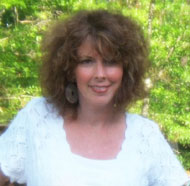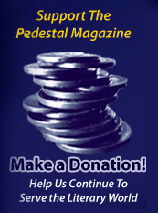Jeanne Marie Beaumont - Impr ...
John Bradley - The Art of Sl ...
William Lusk Coppage - The C ...
Kyle Gray - Through the Fenc ...
Kathleen Hellen - On the Wes ...
Tyler King - Sustain
Lynne Knight - Dog Is Your C ...
Bonnie Wai-Lee Kwong - The R ...
George Looney - The Eternal ...
Sarah Maclay - 49
Marilyn Ringer - The Off-Han ...
George Wallace - bridget

Wicked
There were four of us girls, unless we counted Laura, Ritz’s sister, which we didn’t because she was mean. Ritz was my best friend. We were tails and heads of the same coin. I was skinny with black hair down to my rear, which my father would not allow my mother to cut. Ritz’s hair was short and blonde and curled around her tanned face, light as dandelion fluff. In Ritz’s house, nobody talked normally, they yelled, which was one of the reasons I loved it. At home, I usually had to be quiet because my mother was either thinking or writing or sleeping. At Ritz’s house, I didn’t have to worry about what I said because nobody cared. Insults were expected. When I spent the night, Ritz and I were left to fend for ourselves, often eating cereal for dinner and raw hotdogs for breakfast. Her father, a mechanic, went to work around six every morning and her mother slept until noon, evidence of her nightly indulgences strewn about the living room: overflowing ashtrays, empty glasses with sips of liquor left in the bottom which Ritz or I would finish off, and romance novels splayed open, spines pointed up.
#
The scandal of Howard Mills opened up wide when I was twelve, three years after I moved into the neighborhood, one year after my father had begun to take me on day trips, for hikes in the woods, to the Alpine Slide, or on bug-catching treks. He did this while my mother stayed home, to give her time. He even took me fishing on Lake Champlain with Howard Mills one Saturday. This was before Howard was accused of messing around. According to Jill, while Ritz, Orlando, and I were moving the arrow across the Ouija Board, or stealing Boardwalk and Park Place from each other, or outside, slamming each other in the face and chest with a tethered ball, Jill was down in Howard Mills’ basement.
#
My father was outside loading up the car with the coolers, fishing rods, the tackle box, and other various things we might need. I was in the front seat, the door open, reading Jane Eyre. I enjoyed how the book made me feel, how outrage swelled and blanketed itself over my body, how it almost hurt to breathe. The idea of a man hiding his wife in an attic thrilled me.
#
A couple of hours later, my father pulled the Ford into the dirt lot of a silver diner. Dust flew up around the car as we parked. “I packed our lunches,” I said. My father smiled at me from the driver’s seat and winked. “We’ll have that later.” He twisted round to look back at Howard. “Okay with you, sir?” Howard Mills nodded and said sure, sure, anything was fine by him.
#
The seeds for the accusation that would take down Howard Mills were sown in Ritz’s bedroom. Ritz, Orlando, Jill, and I had cleared all the clutter from her floor in order to sit Indian style and play Monopoly. Laura stood in the doorway and announced their mother was headed to the grocery store.
#
Later that night when I was in bed, I thought about what Jill had revealed and something about it didn’t make sense. I’d spent an afternoon on the lake with Howard Mills and he didn’t ever come across as a creep. We fished for three hours and he told me all he knew about the lake. As we floated by a large cliff, he told me it was at least thirty feet high.
#
That summer, I didn’t see the police car drive up to the Mills’ house. I didn’t see the Mills packing up the moving van. I didn’t see the van drive away. I was at camp learning how to ride horses. What I heard from Ritz was this: Jill’s parents pressed charges, and the charges were eventually dropped because there was no way to prove them. She also told me that both she and Laura were taken down to the basement, separately, and he did the same thing to them that he did to Jill. She told me all this the week after my parents sat me down on our living room sofa and explained I’d be living mostly with my mom, but staying some weekends with my dad. I was having a difficult time sorting things out. But even with my family cracking apart, this thing with Howard Mills was the hardest to understand. I wondered if what Jill and Ritz said was true, and if it was, then why hadn’t Howard Mills ever invited me down to his basement? Did it mean that I was special, or not special enough? And later, I wondered why, when the policeman came to talk to me about Howard Mills I hadn’t been able to say a word in his defense, other than he hadn’t done anything to me. I’d had a chance to say how nice Howard Mills was, how he’d told me stories about Lake Champlain, how he acted like a friend, but the truth of what I knew about my neighbor had sunk to the depths of my mind like a leaking ship. |
|
|



